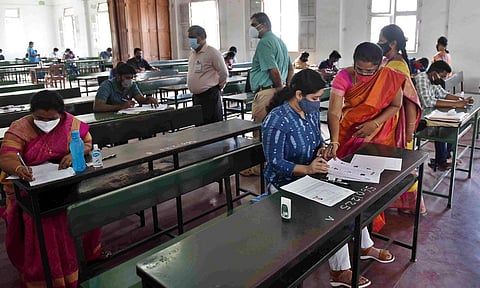

CHENNAI: For the second consecutive year, cut-off mark for the Economically Weaker Sections (EWS) of forward communities is lower than that for OBCs in the UPSC Civil Service Examination. This year 86 candidates have been selected under the EWS quota, for which the final cut-off mark is 894 while the qualifying mark for OBC candidates is 907, revealed the report released by the UPSC on Monday.
The cut-off mark for the EWS quota is lower than that for OBCs in all three stages — preliminary, mains, and final — of the exam. As many as 761 candidates have been shortlisted for the group one exams, conducted for filling 836 vacancies in IAS, IPS, IFS and several other posts. Last year, 78 candidates were selected under the 10 per cent quota earmarked for communities other than OBC/SC/ST.
While the DMK, which had filed a case against the EWS quota in the Supreme Court, termed it ‘illegal’, the BJP justified it saying certain sections of communities cannot be excluded from the ambit of reservation for too long a period.
DMK MP and senior advocate, P Wilson, said proponents of the EWS quota had claimed a chunk of jobs were taken away by candidates of reserved communities at the cost of merit. “Now, how can a quota be given to candidates of forward communities who are less meritorious than the OBCs?” he asked.
In the 1992 Indra Sawhney case, while upholding the OBC reservation, the SC had said quota cannot be provided without empirical data on the backwardness of castes. “The apex court struck down the Maratha quota for lack of scientific data. There is no justification for the EWS quota, and we can demand speedy disposal of the pending case,” added Wilson.
‘EWS quota, a ploy to keep upper castes’ job share high’
Karu Nagarajan, BJP State general secretary, said the EWS quota has thrown open new avenues for people deprived of opportunities under the general category. “Now, poor people from more castes who never got government jobs for generations may be benefitted. It is an inclusive move like any other reservations,” said Nagarajan. He, however, refused to comment on the cut-off mark.
A section of UPSC aspirants rued the EWS quota was just a ploy to keep the proportion of upper castes high in group one posts. S Sivalingam, a UPSC trainer and aspirant from Salem, said, “Had there not been an EWS quota, 86 posts may have been shared among OBC and general category candidates. It was introduced without studying the proportion of forward caste communities in group one jobs.
It’s an attempt to sabotage the growing share of reserved communities in higher posts,” he said. Former UPSC Board member E Balagurusamy, opined those who avail reservation cannot point their fingers against a lower cut-off for EWS.
“Reservation always reduces merit. A lot of forward community candidates lose opportunities owing to the quota,” he said. Claiming the opposition to EWS as merely political, he said there is no illegality in EWS quota having lower cut-off marks.